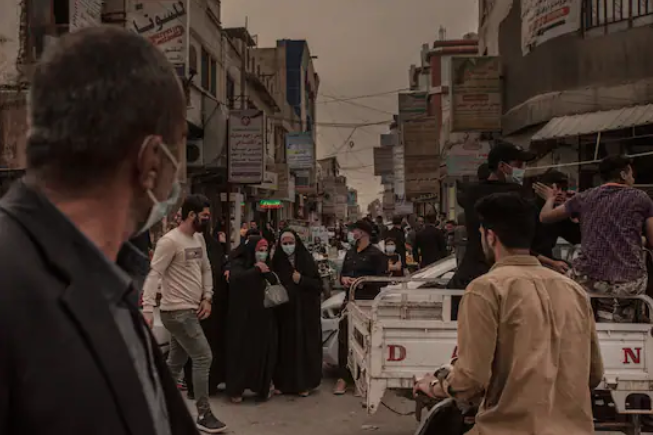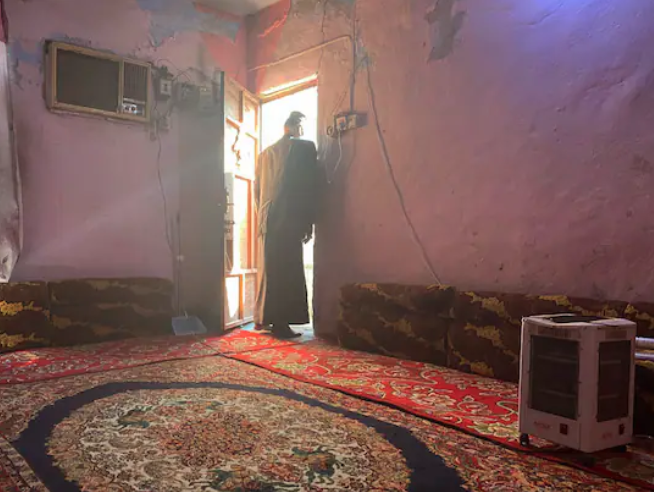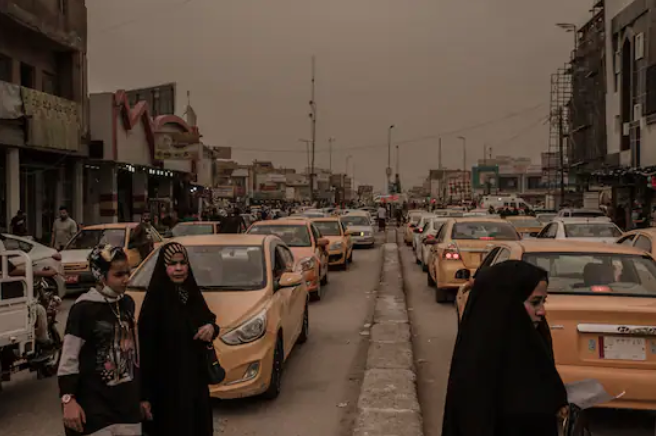As the Iraqi army melted away, it fell often to the mostly Shiite Muslim militias to turn back and rout the Sunni extremists of the Islamic State. For many in the city of Nasiriyah, it felt like a battle for Iraq’s soul.
“Back then, it was just about one thing,” said former militiaman Thamer al-Safi, recalling the battles of 2014 in which two of his brothers died. “This was about our future. This was about Iraq.”
That mass mobilization would have far-reaching consequences, embedding the victorious militias in the upper echelons of power in Iraq and setting them on a course to confront the United States. Backed in many cases by Iran, they have escalated their rocket attacks on U.S. military positions in recent years, threatening to ignite a wider war between the United States and Iran, even now as top officials in Washington and Tehran talk about restoring diplomatic contacts.
Some have roots that date back decades. Their official network, known as the Popular Mobilization Forces, or PMF, was born in 2014 with widespread support across Iraq’s Shiite south, after tens of thousands answered calls by Iraq’s prime minister and by Grand Ayatollah Ali Sistani, Iraq’s highest Shiite religious authority, to fight the Islamic State militants.
And now, as some Iraqis are souring on these Iran-backed militias, the grievances extend well beyond Tehran’s influence to include concerns about what these groups have become and the promises they have broken.
Today, the militias are economic powerhouses and enforcers of the political regime. They are marbled throughout the country’s ruling institutions, and when mass protests erupted against the government in October 2019, Iran-backed armed groups quashed them with deadly force. Human rights groups have frequently accused them of abuses.
“It made me regret that I allowed my brother to fight. I pray every day to live long enough to look out for his children,” said Abdullah, 58, a former militia volunteer who like others interviewed spoke on the condition that his last name be withheld, out of fear of retaliation. An Islamic State sniper killed his brother, Haider, in an ambush in the fall of 2014, he said.
In the corner of their family home, Haider’s son, Karrar, sat listening, tense knees pulled to his chest as he stared at the ground.
In compensation for their deaths, the families of martyrs have traditionally received land and monthly payments from the umbrella commission that manages all the PMF’s affairs. But for some, often poorer families, those benefits are now drying up, feeding resentment at militia groups they once relied upon for a social safety net.
Across Nasiriyah today, as well as in cities throughout the south, some families of the dead are left picking up the pieces, celebrated in public for their sons’ bravery but feeling abandoned, sometimes betrayed, by the militias that they fought and died for.
“They promised us land. They promised us compensation,” said 59-year-old Sattar, sitting on threadbare red cushions in his family home. “The last time I went into their offices, I just threw all our paperwork on their desk and told them I wished I had never sent my son as a martyr.”
Democracy Dies in Darkness
On the wall hung a weathered photograph of his son Mushtaq, who was 18 when he was grievously wounded fighting with the Iran-linked Badr Organization in 2015. In his last call to his family, the young soccer fan had said he was going out on patrol, his father recalled. The brigade was attacked. Mushtaq did not survive the journey to a hospital.
Until last year, the family said, they had received a monthly sum of 900,000 Iraqi dinars, the equivalent of just over $600, from Badr. They have received no explanation for why the payment has stopped.
“They say it’ll return, but it hasn’t,” Sattar said.
Attacks on U.S.-linked sites
Although Iraq’s militia network includes groups from most of the country’s religious sects, the Shiite militias dominate, and many of them are supported by Iran.
Prominent militias such as Kataib Hezbollah, Asaib Ahl al-Haq, Harakat Hezbollah al-Nujaba and Badr have been a source of much concern for U.S. officials, who have accused several of them in recent months of using front groups to launch rocket attacks on U.S.-linked military and diplomatic facilities. These attacks have killed Americans and other foreign personnel, as well as Iraqi citizens, and on several occasions have drawn U.S. strikes in retaliation, killing militiamen.
The Trump administration’s assassination of top Iranian commander Qasem Soleimani and PMF militia leader Abu Mahdi al-Muhandis in Baghdad early last year also heightened tensions between the United States and Iran on Iraqi soil.
With some militias saying they are determined to oust the U.S. military from Iraq, there remain risks of further deaths and an escalation in violence between the United States and Iran. (Officials from the PMF commission did not respond to repeated requests for comment.)
Groups such as Badr, founded in 1982 from exile in Iran, were a factor in Iraqi politics long before this latest conflict. And they were well placed to recruit fighters on the baking summer days when Islamic State militants sacked major Iraqi cities such as Mosul and Tikrit in the north. Badr had an extensive network of offices, and many recruits already had links to the group.
But others, such as Mushtaq, joined because they were alarmed about the Islamic State and fired up to fight — recruitment videos were urging Shiites to fight for their holy shrines and their country — and Badr’s office was the closest.
“His friends were collecting money and Badr was the closest office, so he agreed to register there,” Sattar said, looking down at his hands. “He said they took them without training, and immediately to the front line.”
The PMF uses money from Iraq’s federal budget to pay the families of the war dead. But there is little accountability for where that money goes. Decisions about which groups are funded and by how much are made by a committee of senior militia leaders outside government oversight, according to a research paper by the Chatham House think tank.
The national budget allocates roughly $68 million for the purchase of land for martyr families. But only 3,500 plots have been allocated to relatives of slain militiamen since 2014, according to Iraq’s Martyrs Foundation.
Some Iraqi families say they believe their compensation was cut off because they were no longer useful to the militias. Others said they had received no explanation.
Officials from the Martyrs Foundation involved in the allocation of payments said that they were unaware of any issues but suggested that bureaucratic holdups may be to blame. “Perhaps people don’t understand their own rights, or perhaps there are problems in the bureaucracy,” said Kifa Haider, a spokesman for the foundation. “With the martyrs of the PMF we have no problem because all the procedures to pay them have been followed.”
In a small house on Nasiriyah’s outskirts, built on land allocated as compensation for martyr families, hangs the image of another slain fighter. His face also smiles out from a plaque expressing appreciation for his sacrifice. He is dressed in green fatigues and pictured alongside one of Iraq’s holy Shiite shrines.
His father, Emad, said he had argued with Ali over his decision to shut down his thriving electronics business to join Harakat Hezbollah al-Nujaba, which recruited locally.
“I told him that Iraq doesn’t deserve you to die for it. All this country will ask of you are duties — it won’t give you your rights,” Emad recalled. “But he said, ‘No, I want to defend my country.’ ” Ali, in his early 20s, was killed in 2016 as he tried to defuse an improvised explosive device in the shrine city of Samarra.
The land where they live is barren and disconnected from the city’s sewage network. When the sun sinks, it reflects off the stagnant water flooding the track to their house.
“There’s frustration in general among many families like us,” Emad said.
Nodding, Ali’s brother Hussein said that he had joined the anti-government protests in his own attempt to save Iraq. “My brother joined the fighting for the same reason I joined the protests,” Hussein said.
“We care about our country,” he said. “He would never have joined the group if he understood what would happen later.”
Source (Click Here)




 RSS Feed
RSS Feed